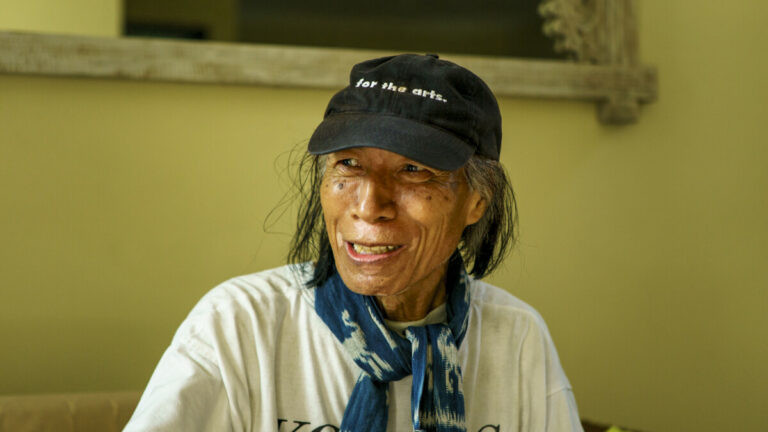Off the beaten path: Five underrated Indonesian authors to dive into
Never mind eased lockdowns or not. Here are five nonmainstream literary legends and stars for those bold enough to dive into.
Change text size
Gift Premium Articles
to Anyone

A
mysterious poet, a controversial yet humorous author and a politically charged debutante are among the country’s most underrated authors whose lives and works lay just beyond mainstream literature.
Rarely recognized outside the circles of the most voracious readers and literary critics, these writers have spent years enriching the cultural landscape with their poetry, short stories and novels. They have pushed the boundaries of language and narrative through their writings on conflict, tradition, migration and hope, which offer a means of getting to know the country beyond picture-perfect postcards.
- Umbu Landu Paranggi
His well-known eccentricities are the stuff of legend, but the Sumbanese poet is perhaps one of the country’s most enigmatic cultural figures. Umbu reportedly never had a bank account, keeping all his money and valuables in a tin can. He eschewed mobile phones, insisting that he could communicate with his closest friends through telepathy. He refused to be vaunted and disappeared for years at the height of his fame in the 1970s.
Using sparse, introspective prose, his poetry tells of his many wanderings and the sensual, almost reverential relationship between humankind and the land that birthed them. On occasion, his wordplay and complex imagery can befuddle even the most ardent readers of Indonesian language and culture. But in poems like “Ibunda” (Mother), he writes with stunning clarity and brevity.
Where to start: Perhaps because of his disdain for fame, Umbu never published a poetry anthology of note during his lifetime. His poems, though, are well documented and can be found in literary journals and online publications.
- Raisa Kamila
It’s not too much to say that Raisa is an up and coming literary star. The Banda Aceh-born writer and researcher has steadily made her mark behind the scenes, spearheading the feminist literary collective Perkawanan Perempuan Menulis and working as an editor at emerging publisher Pustaka Pias. It was well worth the wait for her to publish her fiction work.
Bagaimana Cara Mengatakan Tidak? (Mojok, 2020) is a short story collection to end them all. Focusing on women’s experiences in a variety of unpalatable situations, her stories seem incredibly absurd until readers realize that many are inspired from real-world events. Her stories speak of a society in constant flux in which women are consistently sent to the margins, yet somehow bear the burden of change.
Where to start: Do yourself a favor and get your hands on a copy of Bagaimana Cara Mengatakan Tidak? at the nearest book store.
- Kiki Sulistyo
The Lombok-based poet writes about the ridiculous with as much authority as he does about the sublime. He picks clichéd subjects that are beloved among his peers, like nature or the elusive warmth of home, and spin it with satire or the daily mundane.
Even the titles of his poem are dripping with sarcasm: “Middle-class humor” or the sardonic “Spirit of a young man cooking instant noodles for world peace”.
Look past the wry humor, though, and readers will find a poet with a sentimental eye and indefatigable sympathy for the common man’s plight. In “A thief enters a rooming house”, he locks eyes with a burglar as he slaves over his next poem. Realizing they are both driven by the same desperation, the poet sets aside his anger to instead find a brother.
Where to start: While he has published poetry anthologies regularly over the past decade, Kiki’s breakout work is Di Ampenan, Apa Lagi yang Kau Cari? (What else are you looking for in Ampenan?) published by Basabasi, which earned him the 2017 Kusala Sastra Khatulistiwa literary prize.
- Felix K. Nesi
Controversial, wry and insanely readable, Felix’s Orang-Orang Oetimu (The Oetimu people; Marjin Kiri, 2019) made him an overnight sensation. Hailing from the war-ravaged island of Timor, the novel recounts the misadventures of a town torn apart by corruption, blind ambition and violence as told through the myopic eyes of its inhabitants.
But don’t let the serious subject matter fool you. Felix laces his book with black humor and satire, treating its subject and cast of misfits with as much disdain as sympathy. In his dark little corner of the world, no one is truly innocent, yet neither are they truly at fault. The truth lies somewhere in a grey zone, and you have to push more than you thought possible to get there.
Where to start: Orang-Orang Oetimu, hands down. Writing a novel to top it is a tall order. Small wonder, then, that it was shortlisted for the 2020 Kusala Sastra Khatulistiwa.
- Erni Aladjai
Erni won the highly prestigious Jakarta Arts Council literary competition in 2011 with her novel Kei, which catapulted her to fame. Since then, she has steadily created one of the most underrated oeuvres in Indonesian literature.
Born in Banggai, Central Sulawesi, her stories highlight the complex Sulawesian inner world by weaving together tradition, history and personal narratives to produce intensely personal yet surprisingly critical works.
A journalist by trade, her experiences in the field also bleed into her novels. Expect to find an immersive, insightful look at regions rarely travelled and portrayals so realistic it could only come from a stunningly well-developed understanding of the human condition.
Where to start: Her latest novel, Haniyah dan Ala di Rumah Teteruga (Haniyah and Ala at the neighbor’s house; KPG, 2021), was just released this January to critical acclaim.









